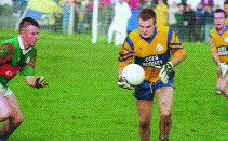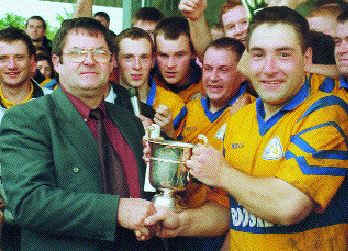
Intermediate Football Championship Final: 19-09-1999

MATCH REPORT
Footballing hours like this one tend to live in the memory. For once, here was a final that was far from the usual anti-climatic fare regularly witnessed in deciders. A devilish helter-skelter experience, in which exchanges throbbed and thrived, was served up. And when a denouncement was required, Kilglass, with Jim Tighe hammering home 2-2 in the last thirteen minutes, concocted a winning elixir that had St. Michaels frowning like they had never frowned before.
The Cootehallers had arrived at Ballinameen hoping to weave a success that would outshine memories reflected in old grainy photographs from their last success in 1971. Instead, they departed a chastened bunch, bewildered by numbing ineffectiveness in front of goal.
It wasn’t that they were shot-shy. Far from it. It was just that following a first half they totally dominated apart from a four minute Kilglass spell, they reached the interval in arrears after firing fourteen wides. They hit a post with another effort and the one goal chance they created was lost because of a dallying delay.
Admittedly some level of frustrating waywardness in attack is forever part of Michaels’ make-up and in the past they have often come good late on. And such a pattern nearly transpired again when Kevin Guckian’s goal midway through the second half repaired much of the self-inflicted damage of the first.
It seemed Michaels had happened upon a brisk trot that would take them to victory.
However, having spent much resources in eventually moving ahead by a point, their momentum stalled and Kilglass, coming with a late gallop that had Tighe at its hub, breezed past Michaels to enter the giddy heights they so much desired.
It was compelling stuff, enhanced greatly by having Ballinameen as its venue. Much indulgent chit-chat had been voiced in the build-up that the venue was not the proper place to hold a county final of such magnitude. Not so. With the heavy rain making conditions extremely heavy underneath and a stiff wind blowing, the effects of the elements magnified the efforts of the combatants. No tackle was flinched and with the bumper crowd enjoying the tight confines of being so near the pitch, a buoyant atmosphere was stoked.

Adrian Lannon take charge of the ball

Tom Tully on the ball
The players revelled in it and the hour zoomed quickly by before Jimmy Gacquin’s well-organised terriers had sufficiently pierced Michaels defence. Kilglass were deserving winners but their tentative first half showing had been cause of great concern. Their sprightly start notwithstanding, an opening in which Tommy Washington proved peerless in orchestrating creative options, Kilglass absorbed a glut of pressure.
Losing out at midfield where Michaels’ Dermot Lane continuously rose effectively and Ian Cooney undertook great work around the fringes to move breaking ball forward, Kilglass were constantly on the backfoot. Granted they defended diligently, especially when substitute Adrian Lannon was introduced to try and curb Lane and Joey Casey slipped back to encroach upon the room Thomas Diffley was allowing Ronan Cox.
But the game’s opening was all about Michaels’ frustrating folly when shooting. It was certainly a case of starting as you mean to go on. Three wides in the opening ninety seconds were posted and that annoying opening agitated Michaels even more when Kilglass, with their one real phase of attacking eminence in the half, returned 1-2.
Their seventh minute goal illustrated opportunism at its best. Padraic Nugent’s free found Washington, who had already jinked effortlessly past Conor King in creating two earlier openings pointed by Nigel Bushell. Toiling down the right, his inviting infield ball tempted Michaels ‘keeper Rory Donnellan to come and collect. However Thomas Tully, seizing his moment, nipped in behind a defender and touched the ball away before Donnellan arrived to leave him with the simple task of slotting the ball into an unguarded net.
It was economical chance-taking that was badly needed as from there the flow of possession, apart from Nugent’s forty metre solo for a 25th minute point, was all Michaels. With Kilglass ‘keeper Sean Davis unable to gain sufficient elevation and length with his goal-kicks into the wind, Michaels, with Lane in particular to the fore, unrelentingly pressed their opponents backwards.
Chances came their way aplenty but in the act of shooting, Michaels resembled a bunch of tyros. Stung by Kilglass’s scoring efficiency, Michaels appeared edgy when given shooting chances and even the easy opportunities, of which they were a few, slipped wide.
An element of naivety further hindered them as Lane twice punted balls out wide that were neither shots nor passes inside. And to make matters worse, luck was not an ally as Lane hit a post with a shot for a point and a thirteenth minute move that could have brought a goal ended with Maurice Martin struggling to keep his feet. The ball was deflected upwards into the air and Kilglass won a free in the bunching that went on to get underneath it when it dropped.
Ray Lannon and Tommy Deehan, in particular, then did much to disrupt Michaels in the act of shooting and a deluge of wides ensued. Another three in another ninety-second bout arrived midway through the half when Michaels, after winning Davis’s restarting kick-outs, could only grimace as Cooney, Lane and Pat Simon all erred badly.
It was an indictment that for all the pressure Michaels inflicted that they reached the break trailing 1-3 to 0-5. As expected, Kilglass, relieved to now have what became a lessening wind at their backs, extended that advantage on the change-over. Adrian Lannon’s point, a belter following a Dermot Washington hand-pass, was inspirational and at 1-6 to 0-6 ahead on thirty-eight minutes, Kilglass strutted like they would not be caught.
Within five minutes, though, such assumption was quickly revised as Michaels finally received a stroke of luck. With Ray Lannon not completing a clearance, the ball went back in towards the square and Guckian somehow managed to toe-poke the ball into the net beyond a surprised Davis.
That levelled it and from the restart, Michaels sallied in front when Gavin Curley and Cooney freed Simon to point the lead. Revitalised, Michaels, following an equalising free from Tommie Washington, moved in front again when Cooney’s overhead pass was knocked over the bar by Simon, the full forward who demonstrated a great zest to forage for possession throughout.
However, the fervour of being in front did not last long for Michaels. Kilglass, having again made their now traditional switch in attack that saw Tully move into full forward, used their target man to perfection. Jumping under a low ball on fifty minutes, he made sure his marker King went with him and on spotting Tighe on a supporting burst, Tully just deflected the ball into Tighe’s path and the forward made no mistake in shaking the rigging with only Donnellan to beat.
Winded, Michaels immediately managed a point through Guckian in reply but they were not to manage another equaliser. Cooney and Simon were both culpable of crucial misses and at the other end on fifty-eight minutes, in Kilglass’s first attack since the goal, Deehan’s free enabled Tully to play a crossfield ball to Tighe, who lost his marker Thomas Conlon and pointed.
Tully was again provider a minute later for another Tighe point, leaving Michaels knowing that a goal would be their only saviour. They tried. A free was taken short in injury time in an attempt to force the score but to no avail.
Then Lane lost possession near the sideline at midfield and while he was left thumping the ground in frustration at having lost the ball, Kilglass countered and took full advantage of a stretched Michaels defence. Realising Tighe was in the clear inside, Dermot Washington angled a kicked pass his way and the inspired forward rattled in a goal that sealed a victory which will be long remembered in Rooskey.
Michaels, however, will care not to be reminded of September 19th. For them it was a demoralising experience, very much another episode of ‘the one that got away’.
Kilglass Gaels: S. Davis; T. Tighe, R. Lannon, V. Murphy; M. McHugh, T. Deehan, T. Diffley; P. Nugent (0-1), J. Casey; T. McDonagh, D. Washington, T. Tully (1-1); N. Bushell (0-3, two frees), T. Washington (0-1, free), J. Tighe (2-2). Subs. used: A. Lannon (0-1) for Diffley (17 mins), Diffley for T. Tighe (44 mins).

Tommy Deehan takes pride in the cup
4 mins: Tommy Washington is fouled having jinked past Conor King. Nigel Bushell points the free - 0-1 to 0-0
5 mins: Washington, raiding on the other flank, again turns provider to allow Bushell point from play - 0-2 to 0-0
6 mins: Maurice Martin chips over an easy free - 0-2 to 0-1
7 mins: Following Padraic Nugent’s free, Washington’s hanging ball tempts ‘keeper Rory Donnellan off his line allowing Thomas Tully to nip in and goal with ease after catching - 1-2 to 0-1
8 mins: Ian Cooney finds Gavin Curley whose run down the left ends with a score - 1-2 to 0-2
14 mins: Niall Roche spies Kevin Guckian in enough space to shoot a point - 1-2 to 0-3
17 mins: Conor McDermott intercepts a pass intended for Tully and Curley’s subsequent pass allows Martin to score - 1-2 to 0-4
25 mins: Having beaten Dermot Lane to possession, Nugent’s sprints away from midfield, running forty metres before shooting - 1-3 to 0-4
29 mins: A push on Curley gives Martin another easy free - 1-3 to 0-5
Half-time: Kilglass Gaels 1-3, St. Michaels 0-5
31 mins: Another Curley run yields another free converted by Martin - 1-3 to 0-6
32 mins: Dermot Washington’s hand-pass allows substitute Adrian Lannon to point - 1-4 to 0-6
33 mins: Lannon’s sideline ends with Tully pointing - 1-5 to 0-6
38 mins: Washington’s ball in helps Tully win a free off King. Bushell converts - 1-6 to 0-6
43 mins: Confusion galore in the Kilglass square allows Kevin Guckian to toe-poke the ball goalwards beyond Sean Davis - 1-6 to 1-6
44 mins: Curley and Ian Cooney link and Pat Simon fires Michaels into the lead - 1-6 to 1-7
45 mins: Tommy Washington kicks over a nerve-settling equalising free - 1-7 to 1-7
48 mins: Trevor McDonagh’s poor clearance allows Cooney’s overhead pass to send Simon in for score - 1-7 to 1-8
50 mins: Tully, now operating at full forward, breaks a dropping ball to Jim Tighe and he beats Donnellan with a firm drive - 2-7 to 1-8
50 mins: Guckian’s pass to Martin sees Michaels grab a quick point in reply - 2-7 to 1-9
58 mins: Tommy Deehan’s free finds Tully and his crossfield ball allows Tighe to pull away from Thomas Conlon and point - 2-8 to 1-9
59 mins: Again playing provider, Tully finds Tighe who points - 2-9 to 1-9
63 mins: With Lane losing possession, Kilglass counter and Dermot Washington’s crisp pass gives Tighe the chance to finish to the net and settle the issue - 3-9 to 1-9

|
| The Semifinal | Home | Over the Years | CONTACTS |